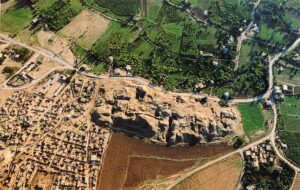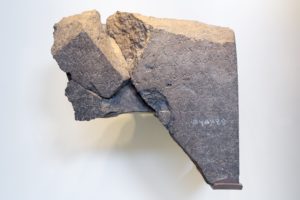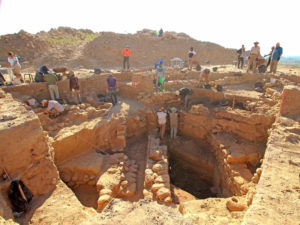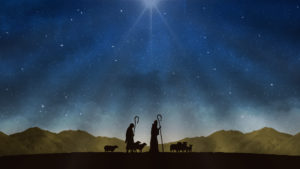 Popular media and mainstream science contend that evolution, despite its many challenges and inconsistencies with the available evidence, is an established and immutable fact. The only debate, they claim, is specifically how evolution occurs, not whether it happens. We only need to study it more to fill in the missing pieces. But ironically, the more science advances in its understanding of biology, the more daunting these hurdles have become.
Popular media and mainstream science contend that evolution, despite its many challenges and inconsistencies with the available evidence, is an established and immutable fact. The only debate, they claim, is specifically how evolution occurs, not whether it happens. We only need to study it more to fill in the missing pieces. But ironically, the more science advances in its understanding of biology, the more daunting these hurdles have become.
Archaeology and the Bible (part 8) – The Resurrection
Of all the historical events described in the Bible, none is more important than the resurrection of Jesus. It is necessary to the truth of Christianity and as Paul states in 1 Corinthians 15:14, “if Christ has not been raised, our preaching is useless and so is your faith.” If such an incredible event had occurred, there would surely be a host of historical and archaeological evidence to support it. Is that what we find? Continue reading
Archaeology and the Bible (Part 7) – The Conquest
Once Israel left Egypt, they began a journey to the land God had promised them. Unfortunately, due to their disobedience and lack of faith, God prevented them from entering the land for forty years until after the unfaithful generation had passed. At that time, Joshua led them into the Promised Land, beginning with the conquest of Jericho. Continue reading
Archaeology and the Bible (Part 6) – Moses and the Exodus
The Timeline
Before we review evidence for Moses and the Exodus, we have to determine when these events should have occurred. This issue is one of significant debate and is important to determining if the Exodus actually happened. Most secular historians claim the Exodus, if it occurred, would have been in the mid- to late-13th century BC. They base this view on the text of Exodus 1:11 which states that the Egyptians used the enslaved Israelites to build the city of Rameses before Moses led them out of bondage. Since the city of Rameses was built in the 13th century, the Exodus must have happened sometime after that. Unfortunately, they also claim that there is little, if any, evidence of the Israelites in Egypt at that time and that does seem to be the case. Continue reading
Archaeology and the Bible (Part 5) – Joseph and the Israelites in Egypt
The story of Joseph and his rise to power in Egypt is often questioned by critics. The idea of a foreigner sold into Egypt as a slave that eventually becomes Pharaoh’s second-in-command and saves the future nation of Israel sounds unbelievable. Combined with the fact that some historians claim there is no evidence of Israelites ever living in ancient Egypt, one has to question if the Bible is simply reporting myths. Continue reading
Archaeology and the Bible (Part 4) – King David, Man or Myth?
Because of the fantastic story of his rise to power—and the lack of corroborating archaeological evidence—many historians and critics doubted the existence of king David and his reign in the 10th century BC. The prevailing academic theory became that he was just a mythological hero, much like King Arthur. Continue reading
Archaeology and the Bible (Part 3) – The Old Testament Prophets
Secular critics often question the prophetic books of the Old Testament. A primary charge is that they could not have been written by actual prophets in the claimed time periods because accurately predicting the future is impossible. Rather, the books were forged at later dates by unknown authors after the supposed prophesies had already occurred. But what does the evidence tell us? Continue reading
Archaeology and the Bible (part 2) – Who Wrote the Pentateuch?
 Biblical tradition holds that the Pentateuch, the first five books of the Old Testament, were written by Moses by around 1,400 BC. Critics, on the other hand, believe that the Pentateuch was written over many centuries by a variety of authors and was potentially not completed until approximately 400 BC. Since these are vastly different perspectives, what does the historical evidence tell us? Continue reading
Biblical tradition holds that the Pentateuch, the first five books of the Old Testament, were written by Moses by around 1,400 BC. Critics, on the other hand, believe that the Pentateuch was written over many centuries by a variety of authors and was potentially not completed until approximately 400 BC. Since these are vastly different perspectives, what does the historical evidence tell us? Continue reading
Archaeology and the Bible (part 1)
As part of a new, multi-part series, we will explore some of the more interesting archeological and historical evidence that supports the truth of the Bible. While we have touched on this topic in other articles (here and here), we are taking a more comprehensive look and covering specific discoveries since the Bible’s credibility is so often questioned by critics. Continue reading
The Nativity: Take Another Look
This Christmas season, we invite everyone to reread and reconsider the Nativity story (Matthew 1:18-24; Luke 1:26-38, 2:1-20) from a fresh perspective. Since Christians are familiar with the birth narratives, we can sometimes take them for granted, missing key truths. So, take a few extra minutes this year, reread these amazing accounts and marvel at the lessons they reveal about God and our Savior, Jesus. Continue reading








